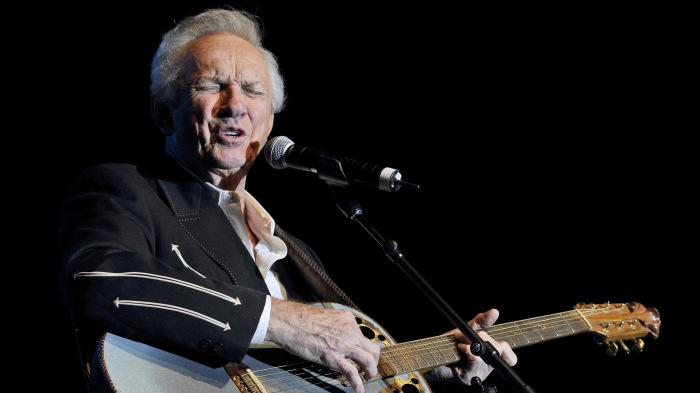Photo Credit Steve C. Mitchell
Mel Tillis, country music singer and songwriter, has died, the Country Music Hall of Fame confirmed in a statement. He was 85.
According to the Tennessean, Tillis died early Sunday morning at the Munroe Regional Medical Center in Ocala, Fla. after almost two years of ill health stemming from a bout of diverticulitis, for which he received surgery. The suspected cause of death is respiratory failure.
Tillis began recording in the late 1950s and continued to perform through 2015, but remained best known for a string of No. 1 country hits in the late ’70s, along with a succession of appearances in Hollywood movies alongside Burt Reynolds and Clint Eastwood that helped make him a household name even outside the country music sphere.
“Mel Tillis spent a lifetime giving us joy and laughter and music, which is why his death brings such sadness,” said Country Music Hall of Fame and Museum CEO Kyle Young. “Had he never stepped on a stage, he would still have been one of the funniest and most genuine people on the planet.”
“But his whimsy and warmth were only a part of his appeal. He wrote some of country music’s most compelling and consequential songs, he fronted a remarkable band, and he sang with power and emotion. He also shone as an inspiration, revealing what others called an impediment as a vehicle for humor and hope.”
In 1976, Tillis won the Country Music Association’s Entertainer of the Year award and was inducted into the Nashville Songwriter’s Hall of Fame. In 2007, Tillis was inducted into the Grand Ole Opry, as well as the Country Music Hall of Fame. President Barack Obama bestowed the National Medal of Arts award upon Tillis in 2012.
Tillis, born Lonnie Melvin Tillis, grew up in Florida and developed a stutter that would stay with him throughout his life as a result of an early bout of malaria; the stutter did not affect his singing voice. Not only did Tillis not try to hide the condition, he trumpeted it with good humor and made it enough of a trademark that he eventually titled his memoir “Stutterin’ Boy.”
He joined the U.S. Air Force and was stationed as a baker in Okinawa, where he formed a band called the Westerners. After leaving the Air Force in 1955 and working several odd jobs, Tillis auditioned for Wesley Rose, who encouraged him to pursue songwriting. Tillis eventually moved to Nashville and began writing songs full-time, most notably for Webb Pierce.
Through the late ’50s and ’60s, Tillis balanced his career as a then-minor hitmaker in his own right with bigger songwriting successes for other artists, including Kenny Rogers and the First Edition’s “Ruby, Don’t Take Your Love to Town” and Bobby Bare’s “Detroit City.” It wasn’t until 1971 that he had his own first No. 1 hit as a recording artist, with “I Ain’t Never,” which he followed later in the decade with the chart-toppers “Good Woman Blues,” “Heart Healer,” “I Believe In You,” and “Coca-Cola Cowboy.”
After his recording career faded in the 1980s, Tillis acquired several radio stations including KIXZ and KYTX in Amarillo, Tex., and WMML in Mobile, Ala., which he eventually sold for a sizable profit. He also found a different kind of fame with a new generation by virtue of being the father of Pam Tillis, who had a run of 13 top 10 hits in the 1990s and often referred to her famous dad.
Tillis was a familiar screen presence in the ’70s and ’80s, with small roles in films including “W.W. and the Dixie Dancekings,” “The Villain,” “Every Which Way But Loose,” “Smokey and the Bandit II,” and both “Cannonball Run” movies. He also briefly co-hosted an ABC prime-time series, “Mel and Susan Together,” with supermodel Susan Anton in 1978. TV guest spots were frequent, including a debut acting appearance on “Love: American Style” in 1973, followed by shows like “The Dukes of Hazard,” “The Tim Conway Show,” and “The Love Boat.”
The most prominent latter-day cover of a Tillis song came when Robert Plant and Alison Krauss recorded “Stick With Me Baby” for their T Bone Burnett-produced “Raising Sand,” which won a 2007 Grammy for Album of the Year.
“Mel Tillis was a guy who had it all: He could write, he could sing and he could entertain an audience,” said Grand Ole Opry announcer and WSM DJ Eddie Stubbs. “There’s a big difference between a concert and a show. Mel Tillis always put on a show….You always felt good about being around him.”



